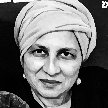I always wonder about how difficult it must have been raising children during Apartheid and more specifically knowing that you were preparing your children for a life of inequality and segregation. Mothers, although ordinary women, did extraordinary things for their families daily. My mother was one such woman.
My mother loved reading and we would go to the community library in Bloemhof Flats in District Six in Cape Town on a weekly basis. It was 1967, during the height of Apartheid. At the library we would meet and greet the librarian, who I would later learn kept banned books aside for some of the library-users, including my mother. The two would speak in hushed tones and I just assumed it was adult conversation, not realising that their furtive-natured discussions were about forbidden books.
And so it was that I learnt to read at the age of four. My parents were strict and limited our outdoor play in the oval opposite Block D in Bloemhof Flats. I stayed in our one-room living and sleeping space and read and read. Oh, how I loved reading. Each time I walked into the community library my heart would beat faster with excitement: so many books to read!
In 1970, a few weeks before my 7th birthday my mother had her fifth child and first son, Ian. Oh, what overwhelming joy I felt at having a brother and soon I was washing his nappies by hand with a washing plank and sunlight soap. I would go down three flights of stairs with my mother to hang the nappies in a communal washing line area. That is until my father came up with a brilliant idea to create a small makeshift washing line just outside of the flat door. This meant I could immediately hang out the nappies without waiting for my mother to accompany me.
About 10 months after Ian’s birth, we left our one-room living and sleeping space in my granny's flat and moved into a council house in Primrose Park on the Cape Flats.
Reading had helped me to be in the top three of my class for most of my schooling. At Primrose Park Primary School we were very competitive in class, everyone wanted to be the top learner. There was a healthy rivalry between the boys and girls. Although we lived in a racist, sexist, and patriarchal society the girls competed on equal terms with the boys, thanks to our Standard 3 class teacher, Mrs Elma Woolf (née Barlow) who both nurtured and challenged both the boys and girls to do better each day.
Mrs Woolf was a most exceptional teacher, and I was a diligent and active learner in her class. Going to school every day was thrilling and a complete delight. On this day, in English class, Mrs Woolf gave us a listening test. She read out the questions and we wrote down the answers next to the appropriate number. One of the questions was, “What dries washing quicker, sun or wind?”
I wrote down wind. As Ms Woolf went through the questions and answers we raised our hands, and she would call on a learner to give the answer. We got to the washing question, and I raised my hand. I answered: “Wind dries washing faster than sun,” and Mrs Woolf said, “Correct!”. An uproar broke out with the boys in class.
“No, Mrs Woolf, sun dries washing faster! No, no!” the boys could not accept that I was right, and they were wrong. They told Mrs Woolf it was obvious that sun dried clothes faster than wind. Mrs Woolf then turned to me and asked, “How did you know the answer was wind?” I replied: “Because I wash nappies every day by hand.” And so it was that I knew the answer to a question no one else knew in my class.
One day, out of the blue, Mrs Woolf invited me to the front of the class. She proceeded to tell the class that I was the top speller, and I should therefore choose 10 words for a spelling test. I stood in front of the class, with Mrs Woolf’s file in my hand and called out ten words that my fellow classmates should write down on their pages.
I continued to blossom in Mrs Woolf’s class. My love for learning increased exponentially and I excelled at Comprehension, Paraphrasing and Precis.
Washing nappies and clothes was an integral part of my growing up and by the time my 14th birthday came around I had washed six years of nappies of my mother’s last three children.
It came to be that when my mother washed our family’s clothes by hand, I would also help her. Whilst sharing the scrubbing plank she would tell me the story of the library book that she was currently reading. And so it happened that I fell in love with stories.
My mother loved Catherine Cookson’s stories the most. The stories had elements of dire poverty, struggle, love, hate, greed, revenge, fear and intrigue. My mother loved the strength of the Northumbrian working-class characters in Cookson’s books. Characters who would triumph over insurmountable challenges.
But my mother also read more widely than Cookson. She read authors such as Nadine Gordimer, Evelyn Anthony, Rosemary Sutcliff, Alex La Guma, Andre Brink and Erica Jong, to name a few.
So, whilst we scrubbed clothes with a shared washing plank, our hands wrinkled by the water and often itchy because of an allergic reaction to the soap powder, my mother imparted her love for stories to me.
With my mother and Mrs Woolf in my corner, I dare say I was meant to be a storyteller.

